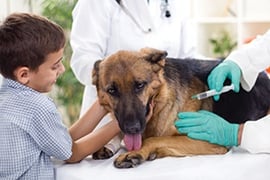Rabies: what is it, and why is vaccination important
Rabies is a viral disease that can affect all mammals, including humans. According to the Centers for Disease Control and Prevention (CDC), wild animals such as foxes, bats, raccoons and skunks account for the vast majority of reported rabies cases each year. That means that a chance encounter with any one of these creatures, puts you and your dog or cat at risk for contracting rabies.
How do dogs and cats get rabies and what does it do?
The virus is spread in the saliva so, a bite from an infected animal could transmit the virus to your pet. Once infected, the virus attacks the central nervous system and can lead to signs such as weakness, disorientation, changes in behavior, seizures, salivation, inability to swallow, paralysis, and fear of water of (hydrophobia). Signs progress quickly and death will occur within days.
When do dogs and cats need to be vaccinated?
Initial vaccination can start as early as 3 months of age. A booster vaccine is given one year later regardless of age at initial vaccination. There is currently a “3-year” rabies vaccine available which means, after the booster vaccine, your pet would not need another rabies vaccination for 3 years.
Can my vet measure antibody titers in their blood to see if they can “skip” the vaccine?
No. Titers do not accurately reflect whether your pet is protected from infection and cannot be substituted for vaccination
What happens if my pet comes in contact with a rabid animal?
It is important to know that ANY pet that is bitten or scratched by a wild mammal or bat, will be considered “exposed”. Pets that have been vaccinated for rabies in the past but that are not current with their rabies vaccination, will need to be evaluated by a veterinarian who will determine the necessary action based on local ordinances. Often, this means being kept under observation for a minimum of 10 days at a veterinary facility (at your expense). Pets that are currently vaccinated for rabies and are exposed, may undergo quarantine at home depending on local laws.
For pets that have no history rabies vaccination, euthanasia may be recommended. Alternatively, your pet will need to be placed in strict isolation (at your expense) for 6 months! Isolation will be at a veterinary or boarding facility, not at your home.
The good news is that rabies is a very preventable disease thanks to effective vaccines. If you have any questions about the rabies vaccine, or any other vaccines, don’t ever hesitate to ask your Best Friends veterinarian. We are part of your pet care team and want to do all we can to make you an informed pet parent.





